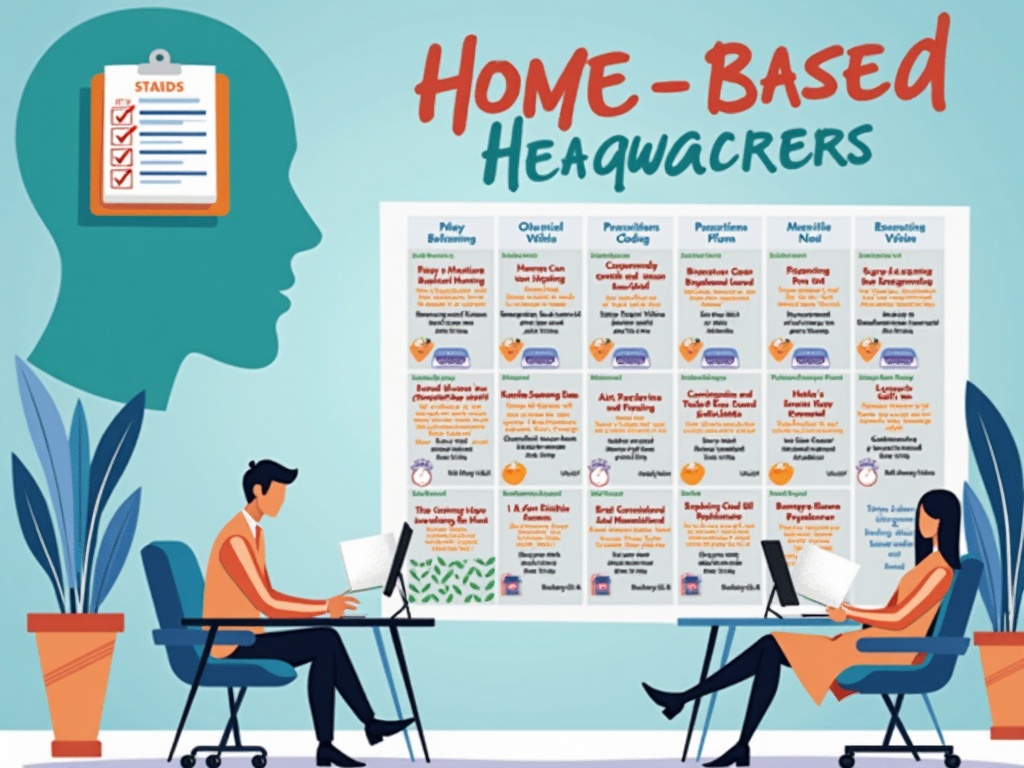Breaking into Medical Billing and Coding From Home: A Beginner's Guide
Imagine a career where you can contribute to the healthcare industry, enjoy the flexibility of working from your own home, and earn a decent living. This isn't a pipe dream; it's the reality for many medical billers and coders. The demand for skilled professionals who can accurately process medical claims and translate diagnoses into standardized codes is consistently high, and technology has made it entirely possible to perform these tasks remotely. If you're looking for a career change or want to enter the workforce with minimal formal education requirements, medical billing and coding from home could be the perfect fit. This comprehensive guide will walk you through everything you need to know to get started.
Is Medical Billing and Coding From Home Right for You?
Before diving headfirst into certifications and coding manuals, it's important to assess whether this field aligns with your skills and interests. Consider the following:
- Attention to detail: Accuracy is paramount in medical billing and coding. A single misplaced decimal point or incorrect code can lead to claim denials and financial repercussions.
- Analytical skills: You'll need to analyze medical records, understand medical terminology, and apply coding guidelines to accurately represent patient diagnoses and procedures.
- Computer proficiency: This is a computer-based job, so you should be comfortable navigating software programs, using online resources, and troubleshooting basic technical issues.
- Self-discipline: Working from home requires self-motivation and the ability to manage your time effectively. You'll need to stay focused and avoid distractions to meet deadlines and maintain productivity.
- Communication skills: While you won't be directly interacting with patients, you may need to communicate with insurance companies, healthcare providers, and colleagues to clarify information and resolve billing issues.
If these qualities resonate with you, then medical billing and coding from home may be an excellent career choice.
Understanding the Roles: Biller vs. Coder
While often used interchangeably, medical billing and coding are distinct but intertwined roles.
Medical Coders: Translating Medical Information
Medical coders are responsible for reviewing patient medical records and assigning standardized codes to diagnoses, procedures, and treatments. These codes are drawn from specific coding systems, primarily ICD-10-CM (International Classification of Diseases, Tenth Revision, Clinical Modification) for diagnoses and CPT (Current Procedural Terminology) and HCPCS (Healthcare Common Procedure Coding System) for procedures and services. Accuracy is crucial, as these codes determine how healthcare providers are reimbursed by insurance companies.
Medical Billers: Submitting and Managing Claims
Medical billers take the codes assigned by coders and use them to create and submit insurance claims. They also handle claim denials, investigate discrepancies, and follow up with insurance companies to ensure timely payment. Billers need to understand insurance regulations, billing procedures, and patient payment policies.
In smaller practices, one person may handle both coding and billing tasks. However, larger organizations often have separate coding and billing departments.
Essential Skills and Training: Getting Certified
While a formal degree isn't always required to enter the field, earning a professional certification significantly enhances your job prospects and earning potential. Certifications demonstrate your knowledge and competence to potential employers. Here are some of the most recognized certifications:
- Certified Professional Coder (CPC): Offered by the American Academy of Professional Coders (AAPC), this is a widely respected certification for medical coders.
- Certified Coding Specialist (CCS): Offered by the American Health Information Management Association (AHIMA), this certification is another excellent option for coders, particularly those working in hospital settings.
- Certified Professional Biller (CPB): Also offered by the AAPC, this certification validates your expertise in medical billing practices.
To obtain these certifications, you'll typically need to complete a training program and pass a comprehensive exam. Training programs are available online and in person, and they cover topics such as medical terminology, anatomy and physiology, coding guidelines, billing procedures, and insurance regulations.
Choosing the Right Training Program
Selecting a quality training program is crucial for your success. Consider these factors when making your decision:
- Accreditation: Look for programs that are accredited by reputable organizations, such as the Accrediting Bureau of Health Education Schools (ABHES) or the Commission on Accreditation of Allied Health Education Programs (CAAHEP). Accreditation ensures that the program meets certain quality standards.
- Curriculum: The curriculum should cover all essential topics, including ICD-10-CM, CPT, HCPCS, medical terminology, anatomy and physiology, billing procedures, and insurance regulations.
- Instructors: Experienced and qualified instructors can make a significant difference in your learning experience. Research the instructors' credentials and experience before enrolling.
- Cost and payment options: Training programs can vary widely in cost. Compare prices and explore available financing options.
- Placement assistance: Some programs offer career services, such as resume writing assistance and job placement assistance.
Research different programs thoroughly and read reviews from former students before making your decision.
Setting Up Your Home Office
To work effectively from home, you'll need a dedicated workspace that is free from distractions. Here are some essential items to include in your home office:
- Computer with high-speed internet access: You'll need a reliable computer and internet connection to access online resources, coding software, and billing systems.
- Ergonomic chair and desk: Proper ergonomics are essential for preventing injuries and maintaining comfort during long work sessions.
- Coding manuals and references: You'll need access to the latest coding manuals, including ICD-10-CM, CPT, and HCPCS. Online coding resources can also be helpful.
- Printer and scanner: You may need to print and scan documents related to patient records and insurance claims.
- Secure file storage: Protect patient privacy by storing sensitive information securely, either on a password-protected computer or in a locked file cabinet.
Finding Remote Medical Billing and Coding Jobs
Once you have your certification and a well-equipped home office, it's time to start your job search. Here are some strategies for finding remote medical billing and coding positions:
- Online job boards: Websites like Indeed, Monster, LinkedIn, and ZipRecruiter regularly list remote medical billing and coding jobs. Use relevant keywords, such as remote medical coder, work from home biller, and telecommuting medical billing.
- Healthcare staffing agencies: Many staffing agencies specialize in placing healthcare professionals, including medical billers and coders. Contact agencies in your area and inquire about remote opportunities.
- Directly contact healthcare providers: Reach out to hospitals, clinics, and physician practices to inquire about remote billing and coding positions. Even if they don't have any current openings, they may be willing to consider a remote worker.
- Networking: Attend industry events, join online forums, and connect with other medical billing and coding professionals. Networking can help you learn about job opportunities and make valuable connections.
Building Your Experience
Landing your first remote job can be challenging, especially if you have limited experience. Consider these strategies for building your resume:
- Volunteer: Offer your coding or billing skills to a local clinic or non-profit organization. This can provide valuable experience and help you build your portfolio.
- Freelance projects: Look for freelance coding or billing projects on websites like Upwork and Fiverr. Even small projects can help you gain experience and build your confidence.
- Internships: Some training programs offer internships that provide hands-on experience in a medical billing and coding environment.
Staying Up-to-Date
The medical billing and coding field is constantly evolving, with new coding guidelines, regulations, and technologies emerging regularly. It's essential to stay up-to-date to maintain your skills and remain competitive. Here are some ways to stay informed:
- Continuing education: Attend workshops, seminars, and online courses to learn about the latest industry trends.
- Professional organizations: Join organizations like the AAPC and AHIMA to access resources, networking opportunities, and continuing education programs.
- Industry publications: Read journals, newsletters, and blogs that cover medical billing and coding topics.
- Coding updates: Stay informed about annual coding updates from organizations like the Centers for Medicare & Medicaid Services (CMS).
Earning Potential and Career Advancement
The salary for remote medical billers and coders varies depending on experience, certification, location, and employer. According to the U.S. Bureau of Labor Statistics, the median annual wage for medical records and health information technicians (which includes medical billers and coders) was $46,660 in May 2022. The highest 10 percent earned more than $78,260.
With experience and additional certifications, you can advance to more specialized roles, such as coding auditor, compliance officer, or medical billing manager. You can also specialize in a particular area of medicine, such as cardiology or oncology.
The Future of Remote Medical Billing and Coding
The demand for medical billers and coders is projected to grow in the coming years, driven by the aging population and the increasing complexity of healthcare regulations. The rise of telemedicine and the increasing adoption of electronic health records are also creating new opportunities for remote workers. The ability to work from home provides flexibility and convenience, making this an attractive career option for many individuals. With the right training, skills, and dedication, you can build a successful and rewarding career in medical billing and coding from home.


